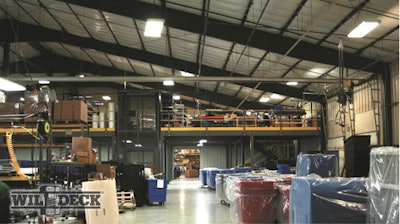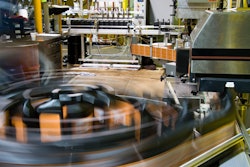
As Thomas Carney reviewed his building’s expansion options, it became clear that only one truly made sense.
Carney, president of Royal Basket Trucks, had been looking to increase the company’s production rates to better meet growing customer demand. To accomplish that goal, the initial thought was that Royal Basket Trucks needed to expand its existing facility with a new wing — a costly option that would take a minimum of six months to complete. But after speaking with Wildeck, a material handling solutions provider based in Waukesha, WI, a new alternative emerged that proved to be a winning combination — optimizing the existing facility with a new work platform and Delta Lift vertical reciprocating conveyor (VRC).
Darien, WI-based Royal Basket Trucks is a manufacturer of basket trucks and specialty laundry carts. Every product is made to order, a philosophy that allows the company to customize wire frame carts by making size modifications specific to a customer’s environment. Having full welding and industrial sewing departments located in its Darien facility enables Royal Basket Trucks to produce orders on a short timeline to better meet its customers’ needs.
At the heart of their dilemma, Royal Basket Trucks needed to improve operational efficiencies within their existing facility space.
“Royal Basket had a flow situation where they were trying to get materials from one part of the building to another where production was located, and it wasn’t working very well,” said Brad Lehman, outside regional sales manager, Wildeck. “The combination of the work platform and VRC was the perfect solution to the flow issue that Royal Basket was facing.”
Wildeck recommended locating materials and production closer together to improve product flow.
A large, unused space in the facility proved to be the perfect location to accomplish this using a work platform and VRC.
“We converted 6,000 square feet of totally unused space into a productive work area,” Carney said. “Once we considered the alternative, a 12,000 square foot building addition for about $500,000 and at least six months to complete, the decision was easy — go for the work platform.”
The task was to build a 40 x 120 foot work platform that would be used for production, and relocate materials and other supplies underneath it. Moving materials back and forth between the ground and upper level would be handled by the VRC.
“We took their product transfer flow from a distance of about 75 feet and reduced it to virtually nothing,” Lehman said. “The VRC was ideal because it now takes raw materials up to the workers, and brings finished products back down.”
The work platform now houses four sewing machines, shelving and other production equipment — all of which are serviced by about 20 employees at any given time. Workers access the work platform using a Wildeck structural steel staircase, while the VRC carries only materials.
Lehman said the solution developed for Royal Basket Trucks is one that can be applied to thousands of manufacturing and industrial applications that are looking to expand their capabilities, but without expanding their facilities.
Another benefit of the work platform was added employee safety.
“The work platform created a much safer work environment for employees because now they’re up off the floor,” Lehman said. “They’ve got forklifts and carts moving about, so the danger of someone being struck is greatly minimized.”
The entire process, from Wildeck’s initial visit with Royal Basket Trucks, to installation only took a few weeks. Wildeck’s prompt customer service was one of the primary drivers in getting this work platform and VRC specified and installed in such a short amount of time.
“From concept to completion, we had a wonderful experience with the Wildeck team,” Carney said. “The Wildeck work platform and VRC were the right solution for us at the right time and at a fair price. We saved time and money, all while getting to work with another fine Wisconsin company.”






















